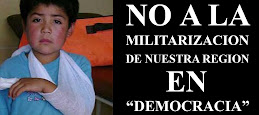
MAPUCHE CONFLICT: CHILE GOV’T FLIP FLOPS AS ABUSES CONTINUE
Despite the government’s professed openness to resolving the Mapuche
conflict, human rights abuses against indigenous people continue in
Chile.
http://www.tcgnews.com/santiagotimes/index.php?nav=story&story_id=15735&topic_id=1
Last week JosÈ Aylwin, co-director of the Observatory for Indigenous
Rights (ODPI) and son of former president Patricio Aylwin, submitted a
scathing letter to Interior Minister PÈrez Yoma detailing serious
human
rights abuses committed by the Carabineros police force against nine
Mapuche detainees in the Region IX city of Ercilla. Aylwin’s letter,
based on testimonies from the nine detainees, recounts in detail the
police tactics he says “can be qualified as torture.”
The nine men were arrested early this month during a two-day public
festival celebrating the anniversary of the city of Ercilla.
Carabineros
apprehended the men individually, claiming they were causing a
disturbance. Aylwin cites witnesses who attest that the festival was a
peaceful gathering with no motive of political or social agitation. The
nine men maintain they were attending the festival for celebratory
purposes only. They are now being held at the Collipulli
commissioner’s
office under charges of public disorder and attacking police officers.
Aylwin claims the arrests were “arbitrary detentions” and that
Carabineros acted “without these men having done anything to warrant
apprehension.” The police did not ask for identification when
arresting
the men nor did they offer reasons for the apprehension.
Even more disturbing, however, is the physical abuse endured by the
Ercilla detainees. Four of the men, upon being taken to the
commissioner’s office, were tied to posts and left there more than 13
hours in police custody while being interrogated and beaten by
Carabineros. The report goes on to describe one detainee who had to get
stitches on his head after a police officer beat him with the butt end
of a gun.
In the letter, Aylwin asks PÈrez Yoma to investigate the
Carabineros’
treatment of these and other Mapuche prisoners. He also sent a copy to
Rodolfo Stavenhagen, special relater to the United Nations for human
rights and indigenous liberties. Stavenhagen has been outspoken against
the Chilean government’s indigenous rights policies.
In the meantime, Carabineros have upped police presence in this
northern
district of Region IX. Residents of Temucuicui, a Mapuche town located
12 kilometers from Ercilla, released a public declaration Tuesday
describing a massive influx of special police forces in their small
community of 120 families.
Temucuicui has been a focal point for conflict between Mapuche and the
police forces that regularly patrol the area. Tuesday’s declaration
denounces the unnecessary militarization of this small settlement,
including the presence of helicopters, tanks, air planes, and an
increased force of police officers decked in riot gear.
As human rights abuses continue in Ercilla, the Chilean government is
still vacillating on the issue of how to resolve indigenous conflict.
Government spokesperson Francisco Vidal said this week that Chile is
open to visits from foreign observers to intervene in the Mapuche
conflict. His comment puts an end to the government’s ongoing debate
on
the matter.
The issue arose last week when the United Nations, along with several
international human rights organizations, sent a petition to President
Michelle Bachelet requesting permission to intervene. Interior Minister
Eduardo PÈrez Yoma responded to the request by saying that
intervention
from foreign observers would be “a welcome help for this problem.”
His
statement, however, spurred backlash from government spokesperson
Augusto Prado, who insisted Friday that, “Chile doesn’t need other
people to tell us how to solve our own problems” (ST, Feb. 11).
Vidal, in an attempt to smooth over the debate, concluded Monday that
Chile’s government, as a democracy, maintains an open-door policy to
any
foreign organization that wants to visit Chile. He went on to say,
however, that this does not constitute a formal invitation to these
international groups.
Paulina Acevedo, spokesperson for ODPI, called Vidal’s statement a
small
but important step in approaching resolution. “The current conflict
in
the Mapuche community is the result of a prolonged lack of concern
about
indigenous rights, and only now is the government beginning to address
that shortcoming,” she told the Santiago Times.
The Bachelet administration has also been weighing a proposal made by
the National Corporation for Indigenous Development (CONADI) to create
a
Ministry of Indigenous Issues. Two weeks ago Bachelet nominated
Rodgrigo
EgaÒa as commissioner of indigenous issues. CONADI, however, wants the
government to go one step further and create a more permanent office to
deal with the matter.
In a statement to the press Tuesday, Secretary General to the President
JosÈ Antonio Viera-Gallo expressed interest in the proposal, but the
government has yet to take any concrete measures to create the proposed
ministry. (Ed. Note: Please see related feature story in today’s
Santiago Times.)
SOURCES: LA TERCERA, EL MERCURIO
By Alex Cacciari
Mapuche International Solidarity Network
mapucheinternationalsolidarity@gmail.com









No comments:
Post a Comment